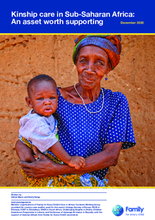This paper argues that kinship care – the care of children by relatives or friends of the family – represents the greatest resource available for meeting the needs of girls and boys who are orphaned or otherwise live apart from their parents. Using evidence from an in-depth literature review and six country case studies carried out by Family for Every Child members in Ghana, Liberia, Ethiopia, Kenya, Rwanda and Zimbabwe,1 it shows that kinship care is widely used, culturally acceptable, and can support the most vulnerable children in ordinary and crisis periods. However, kinship care also carries risk, and kinship caregivers and the children in their care are often highly vulnerable and need support. Evidence and insights from Sub-Saharan Africa have implications for wider global debates on children’s care, and highlight the important need to refocus attention from formal to informal systems of care and protection

